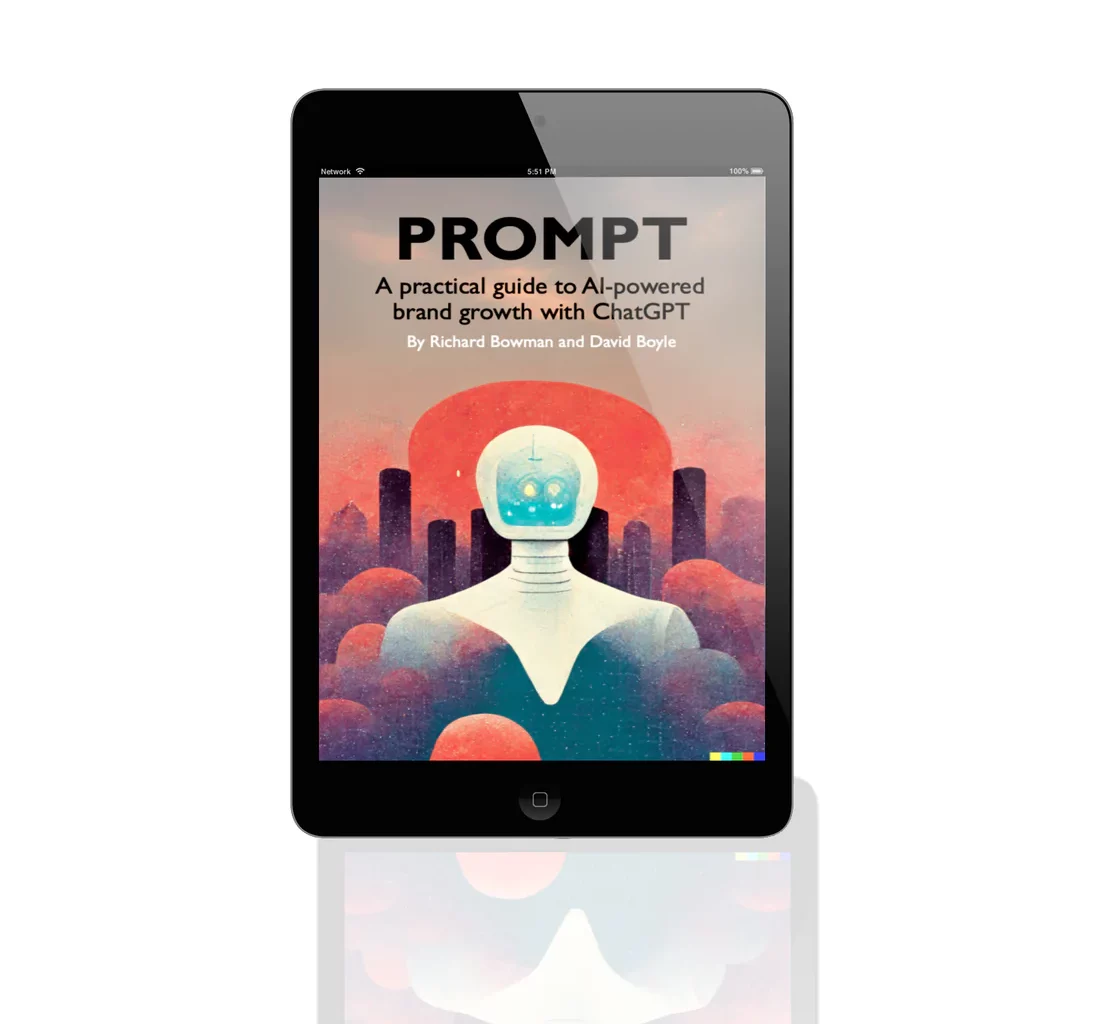When we got word about a new book called PROMPT that explores — and employs — ChatGPT, our eyes widened for a couple of reasons.
- We’re fascinated by artificial intelligence in general and ChatGPT in particular, so fascinated that we tested out ChatGPT as soon as it debuted to the public.
- We thought, well, that was fast. ChatGPT landed only last month, and there is a book already? (Turns out there are a few.)
So, we reached out to Richard Bowman and David Boyle of Audience Strategies, the authors of “PROMPT, A practical guide to brand growth using ChatGPT.”
We asked questions that went beyond the ChatGPT applications they illustrate in the book. And their answers went beyond—well beyond—the business world to touch on matters like family life, and even love.
Here’s the Q&A, edited for brevity.
Q. You aim this book at those in the marketing profession. How might it be valuable to others?
A. At its heart, ChatGPT utilizes artificial intelligence, as a way of generating ideas, insights and content. In the book, we apply these to helping brands to better understand their audience and develop growth strategies, but these high-level uses, and many of the specific ideas, tips and tricks in PROMPT could easily be applied in other areas of business and beyond.
For example, in the field of product development, ChatGPT could be used to generate ideas for new products, or in human resources, ChatGPT could be used to analyze employee feedback and identify areas for improvement. A CEO could use it to write motivational speeches or to translate complex ideas into language their workforce can relate to.
We should be using it way beyond the constraints of labor, though. It can also help us in love and life as well.
For example, in love, you could use PROMPT to help you clarify and communicate who you are when dating. In relationships, it can help you develop and meet relationship goals, such as increasing communication or improving financial stability, helping couples identify and work towards their shared objectives. It could also generate unique date ideas, predict compatibility with a potential partner, generate personalized love letters or messages for a partner, offer relationship advice or suggestions for romantic gestures, and help with communication by suggesting the right words to express feelings or resolve conflicts. Although, even more so than with labor-related use cases: you’d be well advised to be careful what you use it for!
In the context of family life, ChatGPT can help generate ideas for family activities, plan for family events or holidays, or help find activities that will interest all family members. It could identify common interests and suggest activities or ideas that would bring family members closer together. For example, ChatGPT could help come up with thoughtful gifts for family members, advise on how to handle family issues, or recommend activities that could help strengthen the bond between family members. ChatGPT could also be used in family counseling sessions to provide additional insights and understanding of familial patterns, conversations and dynamics.
We believe this tool should help almost everyone with almost everything. That’s a bold claim, we know.
Q. You refer to PROMPT as a “cookbook for the marketing world.” Nice turn of phrase. The book talks about the difference between creativity and what can be produced by AI. Is “cookbook for the marketing world” a turn of phrase ChatGPT could come up with on its own?
A. Richard came up with the cookbook analogy. We then asked ChatGPT to help us think it through and bring it to life for the book. That’s a great use case for ChatGPT—taking ideas you have and helping you to invest the time and brainpower that ideas need if they’re going to get out into the world.
However, if we didn’t already have an analogy, ChatGPT could certainly have come up with it. (To see what ChatGPT came up with when the authors of PROMPT asked for a smart analogy, click here.)
Q. You are up front about the times you used ChatGPT. How do you see such transparency playing out (or not) in the marketing world? What are the expectations and responsibilities around the use of ChatGPT?
A. We aimed to leave the reader very clear on what ChatGPT is (and isn’t) capable of. So it was important for us to always highlight where it helped. But in the real world, I don’t think that is necessary at all.
We emphasize throughout that ChatGPT is a technology that helps humans to do their jobs. But that, ultimately, the human is responsible for fact-checking, editing, enhancing, polishing and ultimately owning any output they choose to share with others. I see no difference between a person getting help from a colleague, friend, copywriter, strategist, the internet or ChatGPT. If the person takes responsibility and owns the output, it doesn’t matter who helped them.
If you need help, you’re crazy to not ask for it. And while there used to be some friction in asking a colleague, friend, copywriter, strategist, the internet—there’s almost no friction in asking ChatGPT for help. We should all get very used to doing so. Further, we might start questioning anyone who delivers sub-par ideas, insights and content who didn’t get help from ChatGPT!
Q. You talk about ChatGPT being a good bullsh—-r in the technical sense. (That’s a great bit.) And given that ChatGPT can give wrong answers, convincingly, and even answer the same question differently at different times, is there a danger that ChatGPT has some BS to it?
A. First, I don’t think we should hold ChatGPT to a higher standard than we hold ourselves and our colleagues to. We’ve worked in dozens of companies, and, for one reason or another, bulls–t (in the technical sense of words that sound convincing but might not be accurate) is everywhere. Often for perfectly innocent reasons, we should add. We quote an academic study in the book that concludes that “folks bulls–t when they are expected to have an opinion on a topic they don’t know and especially when they know they won’t be corrected.”
In writing a report for the electronic music industry recently, we interviewed dozens of industry experts. Leading managers, labels, promoters and artists. We asked what the hot trends were and then went away to validate/evidence them with data. About one-third of the ‘trends’ turned out not to be trends when we dug into the data. About one-third of them were trends, but the data looked materially different to how the trend was described to us. Only about one-third of the time were the trends spot on. If this is about how accurate experts are, it could be argued that ChatGPT is outperforming them!
Q. What’s your crystal ball say? Where is this going next?
A. The only way we’ve ever seen any technology get widely adopted is when it is deployed in a way that is very easy and very good at helping a person to do a specific job. The problem with ChatGPT now is the flashing cursor and the empty prompt box—most users have no idea what job(s) it can help them to do and what to type to get it to be very helpful to them in doing a job. PROMPT is an attempt at solving this as best we can. It lists the jobs that ChatGPT can help with and tells you what to type to get it to help you do those jobs.
Our Chrome extension goes one step further by making many key prompts available with a single click. But even this isn’t enough for mass adoption. Ultimately, apps need building on top that are super-streamlined to help people do specific jobs. We’ll see a proliferation of these in the coming days, weeks and months. They will be what drives mass usage.
For example, today I came across one that creates playlists using natural language. My first query was for “’60s and ‘70s folk singers from England who were technically brilliant but who didn’t reach mainstream success,” and it blew me away. It is a revolutionary new way to create playlists. That would have taken hours of research to do before. Single-purpose apps like this that make particular jobs super easy will be everywhere soon and will drive mass adoption.
In parallel, the core AI will get smarter, more accurate, more creative etc. Enabling it to help with more jobs people are trying to do. That’s all great news, but we’re not focusing too much time on this right now. It is already GREAT and the big win is using it NOW. That’s our focus.






